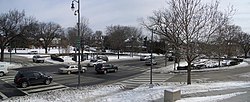Tenleytown
| Tenleytown | |
|---|---|
| Neighborhood of Washington, D.C. | |

Panoramic view of Tenley Circle
|
|
 Map of Washington, D.C., with Tenleytown highlighted in red |
|
| Coordinates: 38°56′46″N 77°04′44″W / 38.946°N 77.079°WCoordinates: 38°56′46″N 77°04′44″W / 38.946°N 77.079°W | |
| Country | United States |
| District | Washington, D.C. |
| Ward | Ward 3 |
| Government | |
| • Councilmember | Mary Cheh |
| Area code(s) | 202 |
| Website | http://tenleytowndc.org/ |
Tenleytown is a historic neighborhood in Northwest, Washington, D.C.
In 1790, Washington locals began calling the neighborhood "Tennally's Town" after area tavern owner John Tennally. Over time, the spelling has evolved and by the 19th century the area was commonly known by its current name, although the spelling Tennallytown continued to be used for some time in certain capacities, including streetcars through the 1920s.
The area is the site of Fort Reno, one of the forts that formed a ring around Washington, D.C. during the American Civil War to protect the capital against invasions. It proved to be the crucial lookout point for preventing a siege of Washington, because it is the highest, natural, elevation point in the District of Columbia.
Fort Reno was decommissioned with the surrender of the Confederate armies. The last remains of Fort Reno were removed about 1900, when the land owned by the Dyer family was being prepared for a reservoir.
Due to its elevation it is also the site of the oldest home in Washington, D.C. Charles Jones's home called "The Rest" was believed to be originally built around 1700 and majorly expanded around 1800. This home stayed in the Jones family until 1920 when the Magruders (local grocers) bought the home. In 1974 the current family owning the home bought the house and still own it today.
In the post-Civil War era, Fort Reno was a free black community. This community was almost entirely wiped out when the federal government decided to condemn most of its housing to build Deal Middle School, Wilson High School, a park, and a water tower. The Jesse Lee Reno school building, which housed an African-American school during the Jim Crow era, is one of the few remaining traces of this history.
...
Wikipedia
